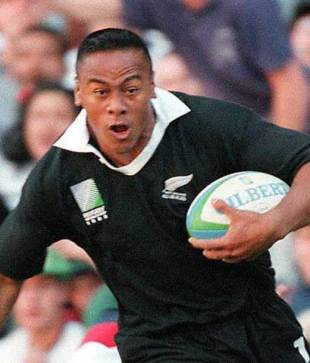|
Ask John
Victors in the Five/Six Nations, Tri-Nations and the the youngest and oldest players
John Griffiths
September 12, 2011

Jonah Lomu is the youngest player to appear in a World Cup final
© Getty Images
Enlarge
Welcome to the latest edition of Ask John where renowned rugby historian John Griffiths will answer any rugby-related query you have! So, if there's something you've always wanted to know about the game we love but didn't know who to ask, or you think you can stump our expert - then get involved by sending us a question. In this edition, John Griffiths focusses on the World Cup looking at parallels between the Five/Six Nations and the global gathering, the youngest and oldest players, referees, grounds and close encounters. Who are the oldest/youngest players to appear in a match at a RWC finals tournament? When Uruguay made their maiden appearance at RWC Finals in the 1999 tournament their captain was Diego Ormaechea who was then 40-years-old. He played Number Eight in their pool matches against Spain, Scotland and South Africa. England's Mike Catt is the oldest player to appear in a Rugby World Cup Final. He was 36 when he took the field for England against South Africa in the Paris final in 2007 - his last cap. But England's oldest RWC tournament player was Paul Rendall. He was 37 years and 232 days when he appeared against Italy at Twickenham in 1991. Simon Shaw will become the oldest Englishman in RWC history if he plays in the current tournament. He was 38 at the beginning of this month. Indeed, only one older player has appeared in any Test for England: fullback Fred Gilbert was nearly 39 when he took the field for England's matches against ales and Ireland in 1923 when England won the Grand Slam. Thretton Palamo of the United States was the youngest to take part in a RWC tournament match. He was just 19 when he played against South Africa in 2007. Jonah Lomu was 20 years and 43 days old when he became the youngest to make a Final (in South Africa in 1995) and Frans Steyn, also 20, was the youngest to appear on the winning side in a Final (in Paris in 2007). How have winners of the Five/Six Nations and Tri-Nations in RWC years gone on to fare in the tournament? England, who went to Australia as Six Nations Grand Slam winners in 2003, are the only team to win a RWC tournament as reigning "hemisphere" champions. New Zealand won the previous Tri-Nations of World Cup years (1999, 2003 and 2007) but failed to reach any of the subsequent Finals. (The Tri-Nations started in 1996). The previous hemisphere champions and their subsequent RWC records are as follows:
Who has refereed most matches in RWC Finals tournaments? There were 233 matches disputed at the first six RWC Finals tournaments. These were controlled by 56 different officials. The breakdown of referees by country reads:
8 - England & Australia
South Korea is the only nation that has supplied a RWC tournament with a referee without competing at a Finals tournament. Scotland's Jim Fleming holds the record for most matches refereed in tournaments. He whistled at a dozen matches between 1987 and 1999, including one as a replacement in 1991 when he deputised after half-time for his injured compatriot Brian Anderson during the Argentina-Western Samoa pool match at Pontypridd. Which grounds have staged most matches across the six previous RWC tournaments? Although Scotland has never acted as host nation for RWC, Edinburgh's Murrayfield has staged most matches in Finals tournaments. The ground was used for 13 matches spread across the 1991, 1999 and 2007 competitions. Cardiff's Millennium Stadium is next on the list with 11 matches in the 1999 and 2007 tournaments, though to the purists this is still the stadium on the grounds of the old "Cardiff Arms". Prior to 1999, when the playing surface ran East-West, the National Stadium staged four RWC matches in 1991 giving Cardiff Arms Park arguably 15 tournament matches altogether. Auckland's Eden Park is set to break records in the current tournament. Eleven games are scheduled there for the 2011 event, adding to the five games staged at the inaugural tournament in 1987. What have been the tightest matches in the previous tournaments? Both the 1995 (South Africa-New Zealand) and 2003 (Australia-England) RWC Finals had to go to extra time (as did the Australia-South Africa Twickenham semi-final of 1999). There have been two drawn pool matches to date:
20-20 - France v Scotland - Christchurch - 1987
… while six matches - four of them involving Ireland - have been decided by one-point margins:
22-21 - Wales v Australia - Rotorua - 1987
Which country has the worst disciplinary record across the previous tournaments?
Fourteen players have been sent off in RWC tournaments. The breakdown by country reads:
All told, 62 players have seen yellow in the tournaments. By nation these are as follows:
Yellow cards were not in use at the early RWC Finals. So Tonga head the naughty list with ten cards altogether. Of the nations that have attended every previous RWC Finals tournament, only Japan has never blotted its copybook. © ESPN Sports Media Ltd.
|
Live Sports
Communication error please reload the page.
-
Football
-
Cricket
-
Rugby
-
- Days
- Hrs
- Mins
- Secs
F1 - Abu Dhabi GP
Abu Dhabi Grand Prix December 11-131. Max Verstappen ()
2. Valtteri Bottas (Mercedes)
3. Lewis Hamilton (Mercedes)
4. Alexander Albon ()
5. Lando Norris ()
6. Carlos Sainz Jr ()
-
ESPNOtherLive >>
Snooker - China Open
Tennis - Miami Open

